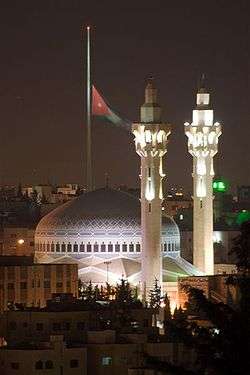Religion in Jordan

| Part of a series on | |||||
| Geography | |||||
|---|---|---|---|---|---|
| History | |||||
|
|||||
| Economy | |||||
| Demographics / Culture | |||||
| Health / Education | |||||
| Government / Politics | |||||
| Armed Forces | |||||
| Transportation | |||||
| Communications | |||||
| |||||
Jordan is a majority Muslim country with 94% of the population following Sunni Islam while a small minority follow Shia Islam and fewer than 800 are Bahá'ís. There are also about 20,000 to 32,000 Druze living mostly in the north of Jordan. Jordan also has a Christian minority, making up 6% of the population, mainly Greek Orthodox or Catholic.[1]
Christians made up 30% of the Jordanian population in 1950.[2] However, high rates of Muslim immigration into Jordan has significantly decreased the Christian percentage of the country's population.[2]
There are no legal restrictions on Jews, but in 2006 there were reported to be no Jewish citizens.[3] Bahá'ís[4] and religious minorities practice freely in Jordan, however, with specific restrictions.
Distribution
The percentages vary slightly in different cities and regions, for instance the south of Jordan and cities like Zarqa have the highest percentage of Muslims, while Amman, Irbid, Madaba, Salt, and Karak have larger Christian communities than the national average, and the towns of Fuheis, Al Husn and Ajloun have either majority Christian or much greater than national average. Several villages have mixed Christian/Muslim populations, like Kufranja and Raimoun in the north.
Anglicans/Episcopalians in Jordan are under the oversight of the Anglican Bishop in Jerusalem. The Church of the Redeemer is the largest congregation by membership of any church in the entire Episcopal Diocese of Jerusalem. Other Episcopal churches are in Ashrafiyya, Salt, Zarqa, Marka refugee camp, Irbid, Al Husn and Aqaba.
Social life
In general, Muslims and Christians live together with no major problems regarding differences and discrimination. However, the smallest minorities, consisting of small Shia, Bahá'ís, and Druze contingents, experience the greatest degree of religious discrimination from the government.[5] Examples include instances of rejection by the Jordanian government to recognize members of the Bahá'í Faith and the Anglican Church.[6]
Religious freedom
The state religion is Islam, but the constitution provides for the freedom to practice one's religion in accordance with the customs that are observed in the Kingdom, unless they violate public order or morality.
Some issues, however, such as religious conversion, are controversial. Although conversion to Islam is relatively free of legal complications, those wishing to leave Islam risk the loss of civil rights and face immense societal pressure. Among the restrictions against religious minorities are:[7]
- Various reports of anti-Semitism (as a provocative reaction to tensions in the Israeli–Palestinian conflict)
- Jordan's government may deny recognition to a religion
- Some religious communities cannot receive national IDs
- Bahá'ís cannot register their property
- Bahá'ís are not permitted to establish schools, places of worship or cemeteries
- Aside from Christians, all other non-Muslim minorities do not have their own courts to adjudicate personal status and family matters
- Christian missionaries may not evangelize to Muslims
In June 2006, the government published the International Covenant on Civil and Political Rights in the government's Official Gazette. Article 18 of that Covenant provides freedom of religion.
See also
References
- ↑ "Jordan International Religious Freedom Report 2005". U.S. Department of State. Retrieved 2014-04-09.
- 1 2 Fleishman, Jeffrey (2009-05-10). "For Christian enclave in Jordan, tribal lands are sacred". Los Angeles Times. Retrieved 2009-05-10.
- ↑ US Department of State (2006), International Religious Freedom Report 2006.
- ↑ البهائيون في الأردن
- ↑ The Berkley Center for Religion, Peace, and World Affairs at Georgetown University: Religious Freedom in Jordan
- ↑ الطائفة البهائية تتقدم بطلب اعتراف من الداخلية
- ↑ Reports on Religious Freedom: Jordan (2000)
| ||||||||||||||
| ||||||||||||||